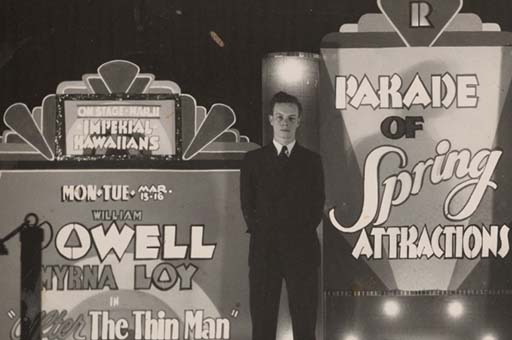The Friends of the Rylander Theatre, winners of a 2021 Georgia Historical Records Advisory Council (GHRAC) grant, have partnered with the Digital Library of Georgia (DLG) to make materials documenting the Americus, Georgia theater’s history from 1921 to 1957 available freely online.
Rylander Theatre Special Collections was digitized and described as part of the DLG’s competitive digitization subgrant program, broadening partner participation amongst nonprofit cultural heritage institutions across the state.
The items in this collection show the “first life” (1921- c. 1951) of the Rylander Theatre and the various types of entertainment the establishment hosted, including live musicals, vaudeville shows, and movies (both silent and “talkies”). In addition, a 1929 school club card and a 1930 theater coupon book show a detailed picture of Depression-era Americus, the popular tastes of this South Georgia town, and details of how local businesses sought to incentivize commerce in their communities during dire times.
Other materials, like photographs, programs, and fliers, provide factual information like names and dates on programs, visual and aesthetic information such as the design of movie advertisement floats in the lobby of the Rylander. The interior design and decoration of the soda shop owned by local businessman George Saliba attached to the Rylander Theatre (and identified in the 1937 Americus city directory as “George’s Place”) are essential to researchers who wish to fill in details related to life in south Georgia. There are also key examples of rural southern movie theater culture within the Jim Crow era, where establishments like the Rylander accommodated segregated audiences and the impact of the Hays Code (the motion picture industry’s self-imposed production code implemented between 1934 and 1968).
Researchers interested in the early life of young Jimmy Carter (the Rylander Theatre’s most famous local patron) would also find the materials in this collection enlightening. Those researchers can dig even deeper into advertisements for Rylander Theatre programming that appear in issues of the Americus Times-Recorder digitized for presentation in Georgia Historic Newspapers. And Carter researchers will be able to connect his lifelong enthusiasm in movies to his presidential daily diary.
Jacob A. Ross, Park Ranger at the Jimmy Carter National Historical Park in Plains, Georgia, describes the importance of this collection:
“As a park ranger for the Jimmy Carter National Historical Park, I consider the Rylander Theatre’s history of being part of President Carter’s history, as the young Carter would often attend shows at the Theatre during the same era these items were created. As a historian interested in southern American culture, this collection has been an enlightening and revealing addition to the unique entertainment and racial histories of theater venues in southwest Georgia…These items also appeal to communities looking to perform a similar restoration of their local theater.”
[View the entire collection online]
###
About the Friends of the Rylander Theatre (Americus, Ga.)
The Rylander Theater in Americus, Georgia, provides community and area visitors a theater and meeting hall for dramatic and musical stage performances, motion pictures, and lectures, with its unique architecture, artistic legacy, and social history to be interpreted through tours and other educational presentations. Read more at rylander.org
Selected images from the collection:
![A black-and-white photo of the facade of the Rylander Theatre in Americus, Georgia. The marquee reads "Mon Tue Bette Davis Edw[ard] G. Robinson in Kid Galahad." A young man sits on top of a motorcycle as he looks back at the theater, and pedestrians walk along the sidewalk in front of the theater.](https://blog.dlg.galileo.usg.edu/wp-content/uploads/2022/01/ryl_rtsc_rtsc18-rylander-theatre-street-view.jpg)


